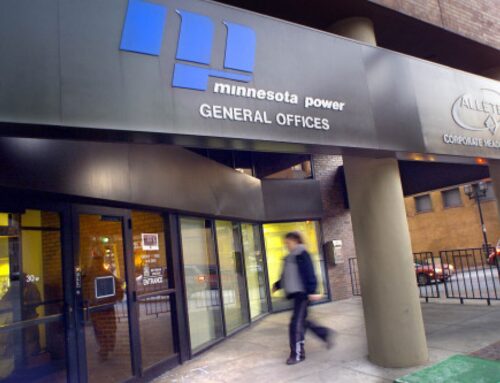Plug-in solar bills are in the works in New Hampshire and Vermont
September 23, 2025

Small solar-panel kits that can be assembled as easily as an Ikea bookcase and plugged into a regular residential outlet could be coming soon to New Hampshire and Vermont. Lawmakers and advocates in both states are preparing legislation that would make these plug-in solar systems accessible to residents who don’t have the space, money, or inclination to install a larger, conventional rooftop array.
“It’s really about energy affordability,” said Kevin Chou, cofounder of Bright Saver, a nonprofit that advocates for the adoption of plug-in solar. “It’s about access for people who wanted solar but haven’t been able to get it.”
These systems — also called “portable” or “balcony” solar — generally come in kits that even a novice can put together at home. They plug into a standard outlet, sending the power they generate into a home’s wires, rather than drawing electricity out.
Unlike rooftop arrays, plug-in systems don’t generate enough power to meet all, or even most, of a household’s needs, but they offset enough consumption to pay for themselves within four or five years, even without incentives like tax credits or net metering, Chou said. Models now on the market start at about $2,000. If the equipment becomes more popular and prices come down, the payback period could get even shorter.
“You don’t need any subsidies to make this work,” Chou said. “The pure economics are so attractive, it’s one of the best investments you can make.”
These systems have taken off in Germany, where more than a million have been deployed, but have been much slower to catch on in the United States.
Recently, though, the idea has gained traction in the U.S. In March, Utah lawmakers, working with Bright Saver, unanimously passed a law authorizing and regulating the equipment, making it the first state to lay out the welcome mat for plug-in solar. Last month, a Pennsylvania state representative announced plans to introduce a similar law, and Bright Saver is having conversations with lawmakers in about a dozen additional states about possible legislation, Chou said.
All of the legislative proposals follow the same principles as Utah’s law: They would define a new class of small, portable solar systems, and establish the right of households to use the systems without submitting applications or paying fees to the state or utilities. They also define safety standards for the systems, including that they be certified by Underwriters Laboratories, or UL, a company that sets standards and provides safety certifications for a wide range of products.
At the moment, two manufacturers make plug-in solar systems with inverters that have been certified as complying with safety requirements, Chou said. Because the market for portable solar is so new, however, UL has not developed standards for entire systems. Bright Saver and other plug-in solar supporters have been working with the company on this issue and expect a standard to be released in the next month or two, Chou said.
Other startups are waiting in the wings, hoping to launch their own products next year, once the questions about UL standards are resolved, he added.
“Bottom line: Once Vermont’s legislation passes, there will be existing manufacturers ready to sell into the state immediately, along with new entrants waiting for additional UL clarity, who are also preparing to launch,” Chou said.
Supporters hope the benefits of plug-in solar — lowered electricity costs, freedom to make personal energy choices — will help the idea gain support even in states not known for their embrace of renewable energy, and despite federal efforts to slow or stop renewable energy progress. The early and robust acceptance of the technology in deep-red Utah has bolstered this vision.
“I am optimistic that, as in Utah, it’s going to be seen as a commonsense way to just get out of the way and let people do good things,” said Ben Edgerly Walsh, climate and energy program director at the Vermont Public Interest Research Group, an organization backing Vermont’s expected plug-in solar bill.
In New Hampshire, a swing state known for its “live free or die” libertarian streak, Democratic state Sen. David Watters also thinks this dynamic might work in the technology’s favor, despite the state’s historical lack of support for measures boosting solar use.
“We’re really kind of stuck in a rut with anti-renewable-energy sentiment in the House,” Watters said. “This seemed like something that would fit into the ethos of people being able to make individual choices.”
Watters, a member of the state Senate Energy and Natural Resources Committee, worked with local advocacy group Clean Energy New Hampshire to author a rough draft of a plug-in solar bill based on Utah’s new law. It will be refined in the coming months and formally introduced in the legislature in January.
Notably, Watters said, his proposal would not stop homeowners associations or landlords from imposing their own rules on members and tenants.
“Their authority is not taken away,” he said. “For this state, that’s crucial.”
In Vermont, two Democratic state legislators — Sen. Anne Watson, chair of the Senate Committee on Natural Resources and Energy, and Rep. Kathleen James, chair of the counterpart committee in the House — are championing a plug-in solar bill based on model legislation drafted by Bright Saver. Watson is particularly excited for the potential of plug-in solar to reach low-income residents and renters.
“This creates access for folks who might otherwise not have the authority to put something on their roof, or who might need something a little more flexible,” she said.
Vermont, a decidedly left-leaning state, has long welcomed renewables. The state’s governor, Phil Scott, however, is a Republican who has shown reluctance to spend public money on clean energy. Further, the legislature lost its veto-proof Democratic majorities during the last election, so prospects for forward movement on energy and climate issues have been dimmed this year.
However, Watson has already heard a lot of positive feedback from her fellow lawmakers, even though the bill won’t be taken up until the legislature reconvenes in January. Indeed, several colleagues came to her with similar proposals before learning she was already working on it. She has also had initial conversations with the Scott administration and found it willing to consider the idea, she said.
“While I can’t say they are necessarily for it, the reception I’ve received so far is that they are open and interested in learning more,” she said. “I am hoping for broad support.”
Sarah Shemkus
is a reporter at Canary Media who is based in Gloucester, Massachusetts, and covers New England.
Search
RECENT PRESS RELEASES
Related Post




